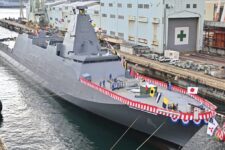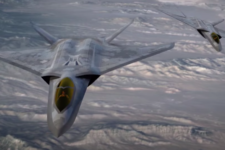
Blue Origin’s New Glenn rocket, image by Blue Origin
WASHINGTON: The GAO decision to sustain one part of Blue Origin’s protest is unlikely to seriously delay Air Force plans to contract next-generation launch services by June 2020, according to the Air Force.
“We are pleased that GAO has validated the Air Force’s fundamental acquisition strategy and source selection approach for the National Security Space Launch Phase 2 Service Procurement,” said Maj. Will Russell, an Air Force spokesman, in a statement today.
“The Air Force is reviewing the single ground of protest sustained by the GAO and expects to resolve this issue definitively and expeditiously,” he added. “The Air Force remains confident in its acquisition strategy and Phase 2 contract award in the third quarter of FY20.”
Nor is it likely to fundamentally shift the balance in the fierce competition, according to experts. Four launch providers — Northrop Grumman, United Launch Alliance (ULA), SpaceX, and Blue Origin — are vying for two contracts (under a 60/40 split) that will lock up all national security launches through 2027, representing billions.
“I don’t think this appreciably changes the competitive landscape, except that it provides more time for congressional appeals by the competitors,” said one former DoD official who is closely watching the contest.
GAO’s finding, obtained by Breaking D, focuses on Blue Origin’s allegations that the May request for proposals (RFP) was vague, in particular regarding the criteria for deciding which two industry proposals would provide best value. GAO stated: The congressional watchdog did not issue its usual announcement detailing the decision so as not to reveal sensitive competitive information.
GAO sustained the protest, finding that the RFP’s basis for award is inconsistent with applicable
procurement law and regulation, and otherwise unreasonable. According to the RFP, the
government will make the two awards by deciding which combination of two independently
developed proposals offers the best value to the government. This methodology, as described
by the agency, however, does not provide a reasonable, common basis on which offerors will be
expected to compete and have their proposals evaluated. GAO recommends that the agency
amend the solicitation.
But GAO dismisses the rest of Blue Origin’s complaints.
Still, Blue Origin CEO Bob Smith welcomed the decision. “This is an important mission to Blue Origin, and we remain committed to our long-term partnership with the Air Force and to working with them as they address the GAO’s recommendations,” he said in a statement released yesterday.
A spokesperson for ULA, however, in injected a slight cautionary note regarding the potential for delay as the RFP is revamped. “While we respect the outcome of the review, we believe the timetable the Air Force has set for this procurement is critical to ensuring on-time launch of the important missions to support our warfighters,” the spokesperson told Breaking D.
The need to rewrite the RFP, however, may be the least of the Air Force’s concerns with regard to the high-priority, but fraught, NSSL effort.
First, a lawsuit by SpaceX filed in May remains pending in the courts.
Second, the House and Senate have yet to agree to a 2020 National Defense Authorization Act (NDAA) to allow new funding to flow to the NSSL effort; with Congress yesterday agreeing to a second Continuing Resolution through mid-November to avoid a government shutdown.
Meanwhile, the Trump Administration is strongly opposed to House NDAA language, pushed by Armed Services Committee Chairman Adam Smith, that would benefit SpaceX and Blue Origin. Those provisions would in effect limit the Air Force’s planned Phase 2 contract for two providers to 29 launches between 2020 and 2024, and require the Air Force to open the competition again after that.
The terror of war, a helo crash mystery and the business of defense: 5 Middle East stories from 2024
From eye-witness accounts of the Israeli invasion of Lebanon to a rare appearance of Iranian weapons at a foreign arms expo, there’s a selection of Breaking Defense’s Middle East coverage.

























